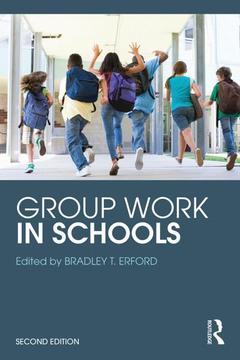Description
Group Work in Schools (2nd Ed.)
Coordinator: Erford Bradley T.
Language: English
Subjects for Group Work in Schools:
Keywords
Professional School Counselor; Psychoeducation Group; group work; School Counseling; group counseling; Classroom Guidance; group therapy; School Counseling Program; psychoeducational groups; Group Leaders; historical; ASCA Ethical Standard; groups; Johari Window; group; American School Counseling Association; functional; Hill Interaction Matrix; foundations; ASCA National Model; forming; Psychotherapy Groups; for; Task Groups; ethical; REBT Group; distinguishing; CACREP; counseling; Comprehensive Developmental School Counseling Programs; chapter; Group Members; based; ACA; and; Group Counseling Experience; action; Reality Therapy Groups; accountability; REBT; setting; Adlerian Groups; section; Gestalt Groups; school; Working Stage; roles; research; psychotherapy; psycheducational; process; planning; perspectives; outcome; orienting; of; multicultural; models; member; legal; leading; issues; working; work; value; used; transition; theoretically; the; termination; task; systemic; stage; special
Publication date: 08-2015
· 15.2x22.9 cm · Paperback
Replaced by new edition: Access to the new edition.
Publication date: 08-2015
· 15.2x22.9 cm · Hardback
Replaced by new edition: Access to the new edition.
Description
/li>Contents
/li>Biography
/li>
School counselors are often the only employees in school settings with any formal education in group work, and yet their training is typically a general course on how to run groups. Group Work in Schools provides an alternative training model; one that presents exactly what counselors need to know in order to successfully implement task-driven, psychoeducational, and counseling/psychotherapy groups in any educational setting. Additions to this newly updated second edition include: discussion topics, activities, case examples, integrated CACREP standards and learning outcomes, as well as an overall update to reflect the most recent research and knowledge.
SECTION I: Foundations of Group Work. Chapter 1: The Value of Group Work: Functional Group Models and Historical Perspectives. Chapter 2: Ethical and Legal Foundations of Group Work in the Schools. Chapter 3: Multicultural Issues in Group Work. Chapter 4: Distinguishing Group Member Roles. Chapter 5: Leading Groups in the Schools. SECTION II: Systemic Group Work: Planning and Process. Chapter 6: Planning for Group Work in the Schools. Chapter 7: Forming and Orienting Groups. Chapter 8: The Transition Stage in Group Work. Chapter 9: The Working Stage. Chapter 10: Termination in the School Setting. SECTION III: Group Work in Action: Models and Special Issues. Chapter 11: Leading Task Groups in Schools. Chapter 12: Psychoeducational Groups in Schools. Chapter 13: Theoretically Based Group Models Used in Counseling and Psychotherapy. Chapter 14: Special Issues in Group Work in Schools. Chapter 15: Accountability in Group Work and School Counseling. Chapter 16: Outcome Research in Group Work
Bradley T. Erford, Phd is a professor in the human development counselling program of the Department of Human and Organizational Development in the Peabody College at Vanderbilt University. He was the 2012-2013 President of the American Counseling Association (ACA). He has authored or edited more than 30 books. His research specialization falls primarily in development and technical analysis of psycho-educational tests and outcomes research and has resulted in the publication of more than 75 refereed journal articles, more than 100 book chapters, and 15 published tests. He has received numerous awards for his scholarship and service to the counselling profession from the ACA and the Association for Assessment and Research in Counseling (AARC), organizations within which he has held numerous leadership positions.




